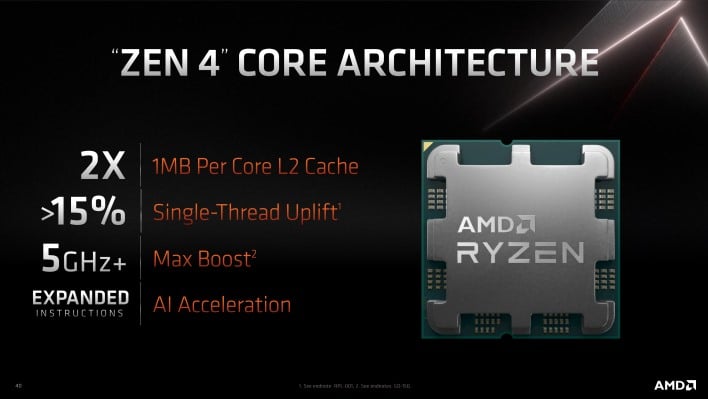AMD Sets Date For Ryzen 7000 Series Processors Live Unveiling This Month
That's finally not a leak or a rumor—AMD itself posted a very brief snippet on its website to announced that the company will unveil "next generation AMD PC products" in a show called "together we advance_PCs." We wouldn't expect to hear much about RDNA 3 Radeons at the announcement beyond perhaps a brief mention along the lines of "these are coming, too."
Instead, this live show will be primarily focused on Socket AM5 and the Zen 4-based processors that slot into it. AMD didn't say much more than that in its message, but based on things the company itself has accidentally leaked, we'll be seeing four models: The Ryzen 9 7950X, Ryzen 9 7900X, Ryzen 7 7700X, and the Ryzen 5 7600X. If we combine the model numbers with leaked data from elsewhere, we get the following chart:
We're still a little dubious on the clock rate info there, but the rest of the information should be accurate, at least. The list looks remarkably similar to the release lineups for the last couple of generations of Ryzen processors, with the bottom model sporting six cores, the top model rolling with sixteen, and all models being unlocked for overclocking. However, all models will also include integrated graphics this time around, too.
Indeed, these processors will be based on the silicon code-named Raphael, and will finally include integrated graphics processors. They'll be based on AMD's extant RDNA 2 graphics architecture that is known for its excellent efficiency, but with only a single Workgroup Processor to work with, we wouldn't expect much from the GPUs.
We expect quite a bit from the CPUs, even though AMD's been relatively modest in its claims about Zen 4 compared to Zen 3. When it revealed the existence of these chips back at Computex, the company wrote ">15% Single-Thread Uplift." That greater-than symbol gives a lot of leeway, but just looking at the number, 15% doesn't sound like a lot. The live demos were more impressive, with the Zen 4 chip hitting 5.5 GHz during gaming and beating a Core i9-12900K by 31% in a Blender render. We've seen some eyebrow-raising leaks, too.




